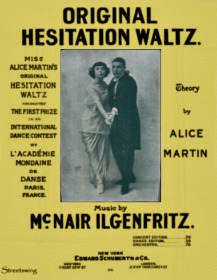Frequently a pianist may hesitate before an important note of arrival in a phrase. Singers are more likely to stretch after they achieve the important note, hesitating to end it. (It’s normal for singers to emphasize sustained vowels. Consonants can usually be prolonged only a limited amount — even in Italian!)
In scripted piano music, waiting just before important notes  (especially if they are harmonically expressive) is tied in with knowing what’s coming next. It may be that the better we know the music, the more likely we are to withhold the arrival of an important note.
(especially if they are harmonically expressive) is tied in with knowing what’s coming next. It may be that the better we know the music, the more likely we are to withhold the arrival of an important note.
This hesitance to deliver the most savory note is a sign of the deadness of the text. If we were more uncertain, we’d shape our rhythmic nuances differently. Telling the listener something is about to happen, further removes the musical experience into simulation.
If we want performances of scripted music that convey spontaneity — convey reality! — then we need to attend to these deadening habits.
The performance intensity communicated in routinely rushing the quickest notes in a phrase may also equal apology. The emoting tempramental performer seems to say: “You all know this canon so well, let me not detain you…”

Interesting thesis, though possibly something of an over-generalisation. (And presented expertly to produce the ‘yes, but…’ response!)
If it happens often enough to be noticeable as an expressive habit (as it must have done in the performances that led you to write this), then clearly the technique is drawing attention to itself to the detriment of communication. As soon as we spot a mannerism, the suspension of disbelief fractures.
But I’m not sure that’s the same as saying that this particular rhetorical flourish is inherently a signal of artifice. After all, in conversation, it’s precisely when we’re not exactly sure what comes next that we hesitate to find the right word. But it’s not something we do all the time (unless we are a young Hugh Grant of course).
liz
And I realize that the manipulation of time (rhythm, metrics, rubato) may be especially important in keyboard music making.
@ Liz Garnett:
Then again, much of what informed the appropriate inflection of a phrase two or three centuries ago (the stressing and prolongation of appoggiaturas or the desynchronization of lines for expressive purposes, for example) is something of which modern musicians are not always aware. There’s a fundamental lack of interest in the practices that applied to the music we play when it was written (and even a certain dismissal). I’m not saying that we should exclusively consider old practices in our interpretations. But it is true that we seem to conform too easily to “prefab” phrasing – an attitude that comes perhaps from the “that’s how it goes” that is often expected by today’s musicians. And musicians do deliver such expectations.
Our listening to recordings, our having categorized eras according to styles (what would have happened had Bach died ten years later? The baroque era would have ended in 1760?), and perhaps even our obsessive use of the metronome, may be all elements that have contributed to the standardization of modern playing and listening. And the hesitation before an important note of arrival in a phrase, expected as it might be, may as well be one of the traits of that standardization.